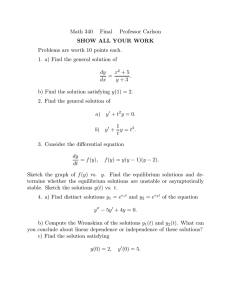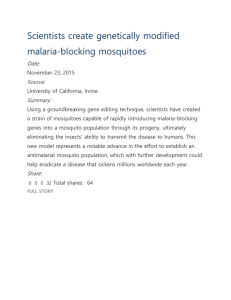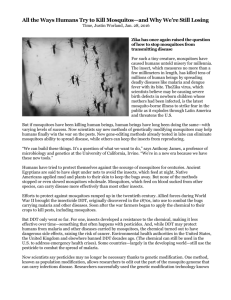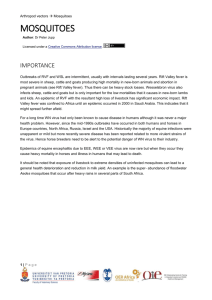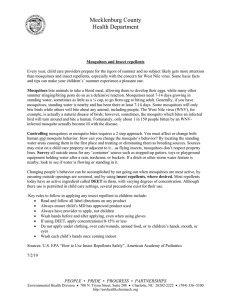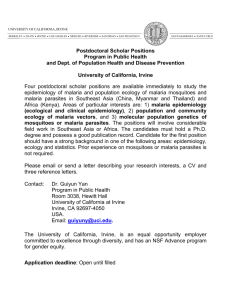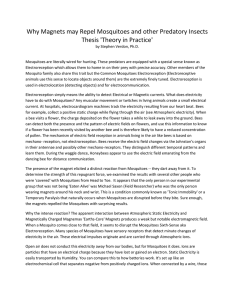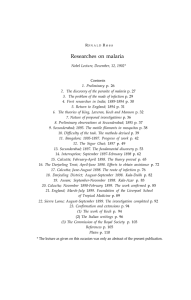Malaria
advertisement
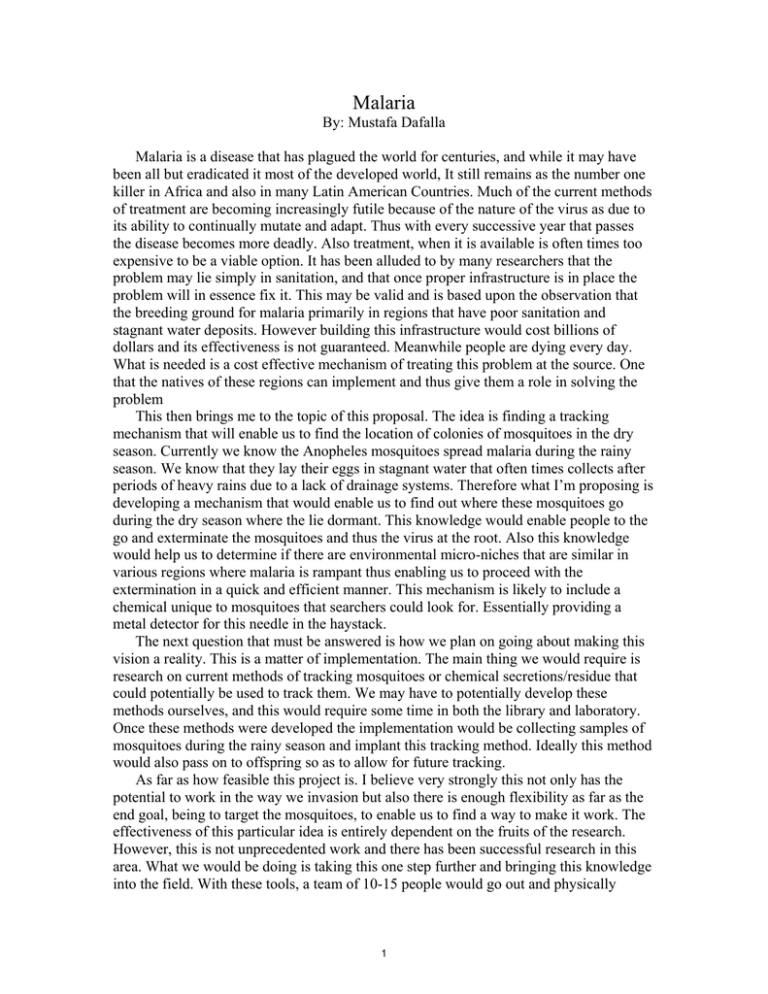
Malaria By: Mustafa Dafalla Malaria is a disease that has plagued the world for centuries, and while it may have been all but eradicated it most of the developed world, It still remains as the number one killer in Africa and also in many Latin American Countries. Much of the current methods of treatment are becoming increasingly futile because of the nature of the virus as due to its ability to continually mutate and adapt. Thus with every successive year that passes the disease becomes more deadly. Also treatment, when it is available is often times too expensive to be a viable option. It has been alluded to by many researchers that the problem may lie simply in sanitation, and that once proper infrastructure is in place the problem will in essence fix it. This may be valid and is based upon the observation that the breeding ground for malaria primarily in regions that have poor sanitation and stagnant water deposits. However building this infrastructure would cost billions of dollars and its effectiveness is not guaranteed. Meanwhile people are dying every day. What is needed is a cost effective mechanism of treating this problem at the source. One that the natives of these regions can implement and thus give them a role in solving the problem This then brings me to the topic of this proposal. The idea is finding a tracking mechanism that will enable us to find the location of colonies of mosquitoes in the dry season. Currently we know the Anopheles mosquitoes spread malaria during the rainy season. We know that they lay their eggs in stagnant water that often times collects after periods of heavy rains due to a lack of drainage systems. Therefore what I’m proposing is developing a mechanism that would enable us to find out where these mosquitoes go during the dry season where the lie dormant. This knowledge would enable people to the go and exterminate the mosquitoes and thus the virus at the root. Also this knowledge would help us to determine if there are environmental micro-niches that are similar in various regions where malaria is rampant thus enabling us to proceed with the extermination in a quick and efficient manner. This mechanism is likely to include a chemical unique to mosquitoes that searchers could look for. Essentially providing a metal detector for this needle in the haystack. The next question that must be answered is how we plan on going about making this vision a reality. This is a matter of implementation. The main thing we would require is research on current methods of tracking mosquitoes or chemical secretions/residue that could potentially be used to track them. We may have to potentially develop these methods ourselves, and this would require some time in both the library and laboratory. Once these methods were developed the implementation would be collecting samples of mosquitoes during the rainy season and implant this tracking method. Ideally this method would also pass on to offspring so as to allow for future tracking. As far as how feasible this project is. I believe very strongly this not only has the potential to work in the way we invasion but also there is enough flexibility as far as the end goal, being to target the mosquitoes, to enable us to find a way to make it work. The effectiveness of this particular idea is entirely dependent on the fruits of the research. However, this is not unprecedented work and there has been successful research in this area. What we would be doing is taking this one step further and bringing this knowledge into the field. With these tools, a team of 10-15 people would go out and physically 1 search an area of 10 by 10 kilometers for the environmental micro-niches. The current hypothesis is that once these niches are found it will be easy to find them in the future. Though there is high confidence that there will be success in devising a tracking mechanism. Though we are optimistic about our plans we do recognize that there are very real obstacles that may hinder the success of the project. The major obstacle is finding the mosquitoes. It is conceivable a team of researchers could go to Africa with the proposed tools and still have difficulty find the mosquitoes. This however would be entirely a function of the effectiveness of the mechanism used for tracking these insects. Once established however, there wouldn’t be any problems of long-term sustainability because it would be a method that worked and could be implemented and once it did it would wipe out the problem of malaria virtually over night. If the method however were prohibitively expensive this would be another problem that would need to be addressed. Though these are real challenges they are not unique to this scientific endeavor and with the proper resources we could ensure a higher chance of success. Specifically, we will need a few material things to make this proposal a reality. We will need approximately $15,0000 to fund this project. This includes travel lodging, research and equipment. There are several sources that we could hope to look to for funding. These sources may include the IMF or the World Bank, and UNICEF. The reason for these sources being singled out as potentials is mainly due to the nature and impact of such a project. We will also need a mosquito expert, a virologist, and natives, along with 3 researches willing to do the legwork of uncovering what have been done and to come up with ideas for how to proceed. We expect a linear progression of the project. The time line for this is 2 summers and 2 IAP periods. The summers being the wet season in which we collect our samples and the IAP being the dry season were we would do the follow up tracking. When deciding whether or not to approve this proposal it is important to realize how much this type of work is need. We recognize that there have been other proposal for means of dealing with this issue by the fact of the matter is that these methods have been ineffective. It is time that we take a novel look at the problem. And find away to eradicate the number one killer in the world. This is a very real threat and even though it maybe uncertain what the results of research will uncover there is no doubt that the information will be important and relevant against this common foe. This is not a proposal about fame and fortune but one about humanity and working together towards saving extraordinary amounts of people while simultaneously improving their quality of life. 2 MIT OpenCourseWare http://ocw.mit.edu ES.259 Information and Communication Technology in Africa Spring 2006 For information about citing these materials or our Terms of Use, visit: http://ocw.mit.edu/terms.
